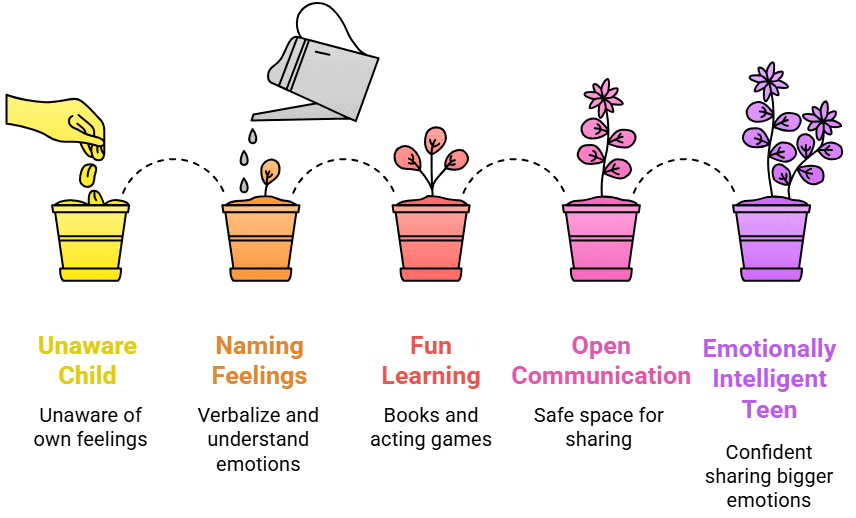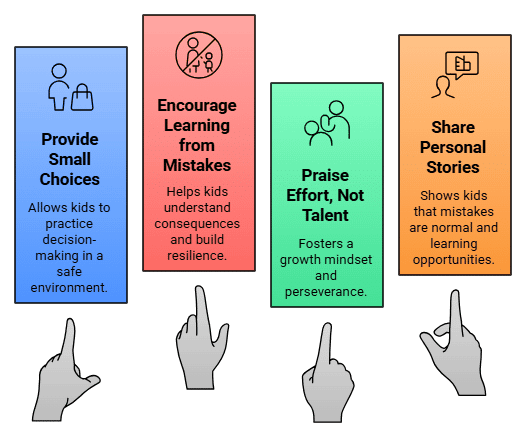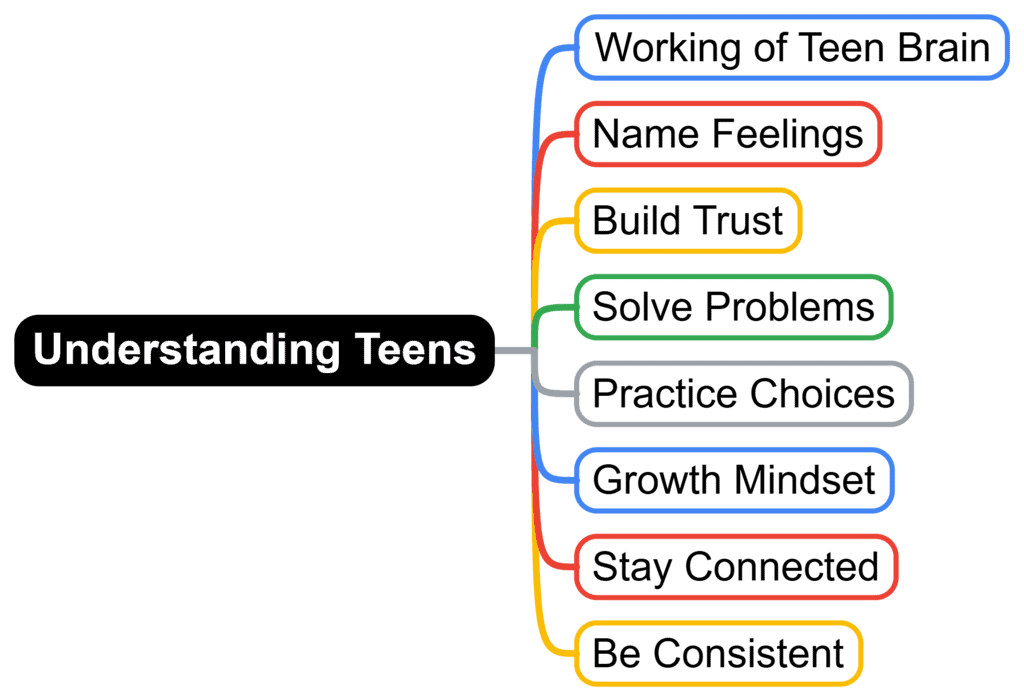Understanding Teens: Tips for Parents of Young Kids | Guide for Mindful Parenting in 2025 - LKG PDF Download
Introduction
Raising young children is a journey filled with joy, challenges, and countless learning moments. As parents, you’re not just nurturing your child today—you’re laying the foundation for their teenage years, a time often marked by intense emotions, big decisions, and a quest for independence.
Understanding how teens think and act can feel like decoding a mystery, but by building key skills and trust early, you can prepare your child (and yourself!) for a smoother transition into adolescence.
What if you could start today with simple, practical habits that make your child feel safe, confident, and ready to face the teenage years?
Here are eight clear, actionable tips to help you foster emotional intelligence, resilience, and a strong parent-child bond that will carry through the turbulent teen years.
1. Know How Teens’ Brains Work
The teenage brain is still growing, especially the part that helps with making smart choices, controlling impulses, and planning ahead. That’s why teens can act without thinking or get super emotional. They’re drawn to exciting things, which can lead to risky decisions, and they feel a strong need to fit in with friends.
Understanding this helps you connect with them and guide them better. With young kids, start talking about why they feel happy, sad, or mad to get them ready for the big emotions of their teen years.
- Teens’ brains are still growing, especially the part that helps them make good choices and control impulses.
- Their emotions can feel extra strong, causing mood swings or risky behavior.
- Teens may act tough but often feel unsure, want to fit in, and face peer pressure.
2. Teach Kids to Name Their Feelings
Help your child build an emotional vocabulary by encouraging them to name feelings like “frustrated,” “excited,” or “nervous.” Use fun tools like emotion charts, storybooks (e.g., The Color Monster), or role-playing games where they act out feelings.
For example, ask, “What does your face look like when you’re happy?” This practice helps kids articulate complex emotions later, making it easier for teens to open up about stress or anxiety.
- Help young kids say how they feel, like “I’m mad” or “I’m sad,” to understand their emotions.
- Read books about feelings or play games like acting out emotions to make it fun.
- Talking about feelings now helps kids share bigger emotions when they’re teens.

3. Build Trust Early
Build a safe space where your child feels comfortable sharing without fear of judgment or punishment.
Practice active listening: put away distractions, maintain eye contact, and reflect back what they say, like, “It sounds like you’re upset because your toy broke.” When mistakes happen, respond calmly with questions like, “What can we learn from this?”
This trust encourages teens to come to you with bigger issues, like conflicts with friends or school pressures.
- Make it safe for your child to talk to you without worrying about getting in trouble.
- Listen closely—put away your phone, look at them, and repeat what they say to show you understand.
- If they make a mistake (like spilling something), ask “What happened?” instead of yelling.
4. Show How to Solve Problems
Show your child how to tackle challenges by thinking aloud through your own decisions, such as, “I’m stressed about work, so I’m going to take a walk to clear my head.” Involve kids in small problem-solving tasks, like choosing a rainy-day activity or resolving a sibling disagreement.
These experiences teach them to approach complex teen dilemmas—like navigating social media or academic stress—with a clear, calm mindset.
- Stay calm and talk through your own problems, like “I have two things to do; let’s pick one.”
- Ask kids to help solve small problems, like “What can we do if your friend can’t play today?”
- This helps kids learn to handle tough situations, like teen friendships, later.
5. Let Kids Practice Making Choices
Empower your child by offering age-appropriate choices, such as picking between two snacks or deciding which park to visit. Allow them to experience natural consequences, like feeling cold if they choose not to wear a jacket.
These small moments build confidence and critical thinking, preparing them for bigger decisions as teens, such as managing time or resisting peer pressure.
- Give young kids small choices, like picking their clothes or what game to play.
- Let them learn from mistakes, like feeling hungry if they skip a snack.
- This builds confidence for making bigger decisions as teens.

6. Encourage a “Keep Trying” Attitude
Encourage resilience by praising effort over innate ability. Instead of saying, “You’re so good at drawing,” try, “I love how much effort you put into that picture!” Share age-appropriate stories of your own setbacks, like a work project that didn’t go as planned, and how you persevered.
This mindset helps teens face challenges like failing a test or losing a friend without giving up.
- Praise hard work, not just talent. Say “You tried so hard!” instead of “You’re so smart.”
- Share stories of your own mistakes and how you learned from them.
- This helps kids stay strong through teen challenges like school stress or friend drama.
7. Keep Your Bond Strong
Carve out intentional time to connect, even if it’s just 10 minutes asking about their favorite part of the day or reading together. Show genuine interest in their world—whether it’s a new game or a playground story.
Offer gentle guidance during conflicts, like, “I see you’re upset; let’s figure this out together.” A strong bond now ensures your teen feels safe turning to you during tough moments later.
- Spend a few minutes each day asking about your child’s day or feelings.
- Cheer them on and guide them kindly when they face problems.
- A strong connection now means your teen will trust you later.

8. Start Small and Keep Going
Big changes start with small, daily habits. Ask open-ended questions like, “What made you smile today?” or listen without interrupting when they share. Create routines, like a weekly family game night, to reinforce a sense of security.
Consistency builds a home where your child feels valued, making it easier for them to confide in you as teens when life gets complicated.
- Do little things every day, like asking how they feel or listening well.
- Stay patient and keep practicing to create a home where your child feels safe.
- This makes it easier for teens to talk to you when things get tough.
By starting these simple habits now, parents can help their young kids grow into teens who are confident, strong, and ready to share their feelings with you.

By weaving these habits into your daily routine, you’re not just parenting for today—you’re equipping your child with the emotional tools, confidence, and trust they’ll need as teenagers. Start small, stay patient, and watch your efforts grow into a lasting, open relationship with your future teen. What’s one step you’ll take today to prepare your child for their teenage years?
|
10 docs|2 tests
|
FAQs on Understanding Teens: Tips for Parents of Young Kids - Guide for Mindful Parenting in 2025 - LKG
| 1. What are the key developmental milestones for young kids in LKG? |  |
| 2. How can parents effectively communicate with their young kids? |  |
| 3. What role does play have in the learning process for young kids? |  |
| 4. How can parents support their child’s emotional development in LKG? |  |
| 5. What are some effective discipline strategies for young kids in LKG? |  |
















